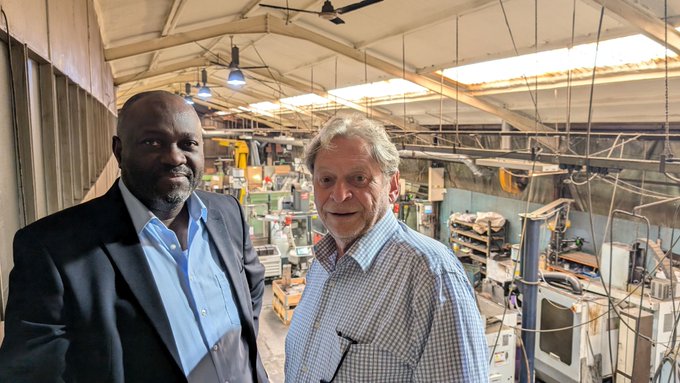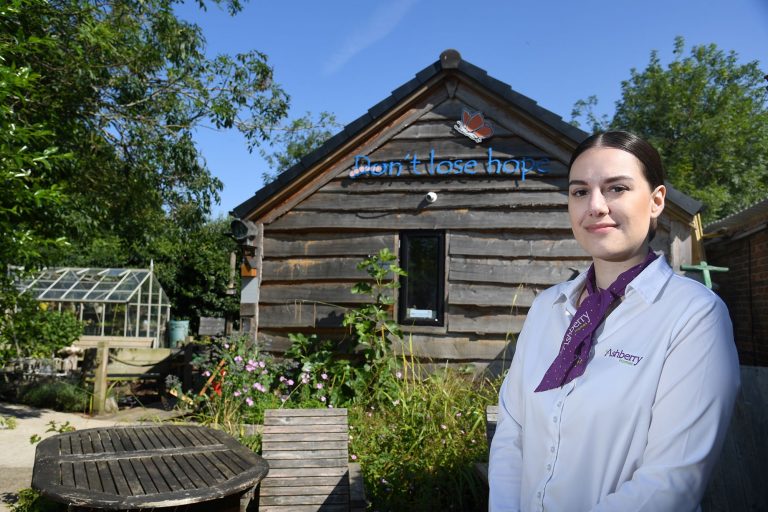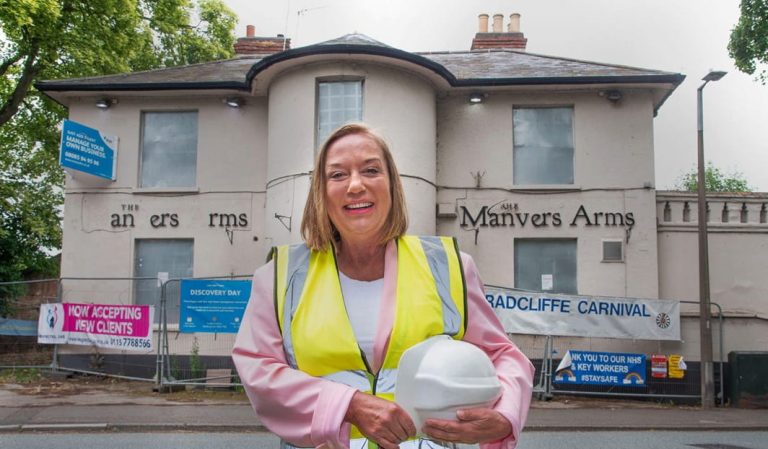Land sold for bungalow scheme in Coalville
Nottingham-headquartered solicitors joins Amputation Foundation legal panel
Outstanding East Midlands businesswomen to be celebrated at ceremony
Wood recycling company fined following collision death
Second sub-letting completed at Discovery House
Could you take home Excellence in Design at the East Midlands Bricks Awards 2024? Enter now!
 Winners will be revealed at a glittering awards ceremony on Thursday 3rd October, at the Trent Bridge Cricket Ground (4:30pm – 7:30pm) – an evening also offering an opportunity to establish new connections with property and construction professionals from across the region, and hear from keynote speaker Paul Southby.
Other award categories open for entry include: Most Active Estate Agent, Contractor of the Year, Responsible Business of the Year, Residential Development of the Year, Developer of the Year, Deal of the Year, Architects of the Year, Commercial Development of the Year, and Sustainable Development of the Year. All entry forms can be accessed here.
The Overall Winner award will also be presented at the event. This award cannot be entered, with the winner selected from those nominated for the event’s other awards. The Overall Winner of the East Midlands Bricks Awards 2024 will also receive a year of marketing/publicity worth £20,000.
Winners will be revealed at a glittering awards ceremony on Thursday 3rd October, at the Trent Bridge Cricket Ground (4:30pm – 7:30pm) – an evening also offering an opportunity to establish new connections with property and construction professionals from across the region, and hear from keynote speaker Paul Southby.
Other award categories open for entry include: Most Active Estate Agent, Contractor of the Year, Responsible Business of the Year, Residential Development of the Year, Developer of the Year, Deal of the Year, Architects of the Year, Commercial Development of the Year, and Sustainable Development of the Year. All entry forms can be accessed here.
The Overall Winner award will also be presented at the event. This award cannot be entered, with the winner selected from those nominated for the event’s other awards. The Overall Winner of the East Midlands Bricks Awards 2024 will also receive a year of marketing/publicity worth £20,000.
Book your tickets now
Tickets can now be booked for the East Midlands Bricks Awards 2024 – click here to secure yours. The special awards evening and networking event will be held on Thursday 3rd October 2024 in the Derek Randall Suite at the Trent Bridge Cricket Ground from 4:30pm – 7:30pm.










To be held at:

Plastic packaging tax working as receipts fall 6% since last year
The number of companies registered to pay the tax rose very slightly by 527, now standing at 4669.
The tax was announced in the Budget in 2018 and officially introduced in April 2022, making this the first year the statistics could be compared. The tax applies to manufacturers and importers of plastic packaging components which contain less than 30% recycled plastic.
Those whose packaging contains the 30% recycled plastic content are exempt but must still register with HMRC and prove the 30% threshold has been met.
Chris Morgan, Tax Director at BDO, said: “This is still a fairly new tax, with many businesses still getting their heads around the details. “Many businesses who technically fall into the net will be overseas entities, importing goods into the UK and there is a chance that the very small increase of just 527 companies registered to pay the tax means some are falling through HMRC’s net. “The fact that there has been a 22% fall in plastic packaging imported into the UK may indicate that importers are switching to other packaging to reduce their exposure to PPT.
“The 6% decrease in the value of receipts collected is likely a result of several factors.
More businesses are investing in their supply chains to ensure their packaging meets the 30% minimum recycled materials threshold or ensuring they can prove this to HMRC. “However, it’s worth remembering that the PPT charged per tonne of plastic has increased by inflation, so without that, the decrease in revenue would likely be significantly higher.
“We can see from these stats that the actual tonnage of taxable plastic packaging has decreased by around 12%, but the tonnage declared with 30% or more recycled plastic, has increased by 6%.
“While this is a good start, looking ahead, the new Labour Government will want to ensure they keep up the pressure on businesses using plastic packaging. As well as increasing the charge each year, this may involve trying to ensure more overseas businesses are aware of the tax and informed of their obligations to register, even if they are exempt. “There is also a strong chance that the government will impose incremental increases to the 30% recycled plastic threshold, putting further pressure on businesses reduce the use of virgin plastic.”
University of Nottingham engineering alumni secure funding for device lowering food & beverage industry emissions
- Reduction in energy bills, due to lower reliance on the National Grid for electrical power;
- Reduction in carbon emissions, because the Biofuel Cell produces direct electricity through a zero-carbon biological process;
- Resilient source of energy year-round independent of weather, because the Biofuel Cell relies on a customer waste, and not wind, sunlight or sludge shipments, to operate.
Council support helps manufacturer secure £3m contract
Destination Chesterfield welcomes eight new board members
- Ann Fomukong-Boden, Owner, Kakou CIC
- Andrew Dabbs, Director, Whittam Cox Architects
- Nick Hogan, Owner, Chesterfield Escape Rooms
- Dominic Staniforth, Partner, BHP LLP
- Ryan Wilkes, Director of Owner Managed Business, Shorts Chartered Accountants
- James Borkoles, Head of Business Development, University of Derby
- Andrew Byrne, Property Development Director, Devonshire Group
- Nick Catt, Managing Director, Weightron Bilanciai
Leicestershire land purchased to unlock housing development
Persimmon Homes North Midlands has completed the purchase of land to unlock a housing development in Newbold Verdon, Leicestershire.
The site will deliver up to 239 new homes. A significant portion of the land will be kept as public open space for the people of Newbold Verdon, helping to enhance the area’s green space and biodiversity. Along with the boost to local housing needs, the scheme will bring with it a range of community benefits – including a total of up to £2.1m pledged towards the nearby area. Within this amount includes over £1m towards education and £160,000 towards healthcare improvements. Dan Endersby, Managing Director at Persimmon Homes North Midlands, said: “We’re proud to have completed the purchase of land to deliver up to 239 new homes in Newbold Verdon. Our upcoming new community will bring a wide range of new benefits to the area, including major improvements to local roads, public open spaces, healthcare, and education. “Of course, what we do is about so much more than building quality homes. This development will not only generate significant job opportunities throughout the lifespan of the project but will also leave a lasting legacy of community benefits for the people of Newbold Verdon and the surrounding areas.”Light Science Technologies secures third order from sports entertainment segment customer
Light Science Technologies Holdings’ Contract Electronics Manufacturing (CEM) Division has received a third order from its customer in the sports entertainment segment, worth £134,000.
Since its first order in the sports entertainment segment was announced in February 2024, Derbyshire-based Light Science has now received orders for a total of 15,000 units, worth in excess of £400,000 in revenue. The order will be completed within the current financial year.
The customer currently has 14 entertainment venues in the US, four venues in the UK, and is rapidly expanding with eight new venues currently under construction in the US.
Simon Deacon, CEO of LSTH, said: “I’m delighted with the continued momentum within the CEM Division and the Group as a whole. Importantly, we are establishing long-term relationships with global clients that have the ability to underpin repeat business opportunities, which we believe will result in increased visibility as we continue to convert our strong quoted sales pipeline.
“The Group has really turned a corner this year in all market sectors, and we’re seeing many of the changes we’ve made begin to yield positive results. In CEM specifically, we’ve invested strategically in our ability to take on larger and more significant contracts, which allows us to capitalise on the post-Covid move away from Far East manufacturing.
“We are excited to play a part in our customer’s expansion as they bring new and innovative solutions to market and we look forward to sharing further progress in the future.”
Topps Tiles makes £9 million acquisition
Topps Tiles has acquired the CTD Tiles brands, 30 stores, selected stock and all related intellectual property from CTD Tiles Limited (CTD), acting by its administrators, James Lumb and Will Wright of Interpath Limited, for a consideration of £9 million.
Prior to entering administration on 19 August 2024, CTD supplied tiles to the retail, trade and commercial markets through a collection of related brands including CTD Tiles, CTD Trade and CTD Architectural Tiles, with total annual revenue of c.£75 million.
The CTD retail business operated 86 stores across the UK, each with a separate trade and retail showroom, and had total store revenue of c.£50 million in the year to June 2024. In addition, CTD’s commercial business reported revenues of c.£16 million from the volume housebuilder segment and c.£8 million of revenues from the Architect and Designer (A&D) segment in the same period.
The stores being acquired by Topps Group had total sales of c.£20 million in the year to June 2024, and the acquisition also includes all the CTD brands, selected stock and customer data. As well as adding 30 new well-established stand-alone stores to the Topps Group estate, the acquisition will provide Topps Group with the opportunity to make a meaningful entry into the housebuilder segment and expand its existing share of the A&D segment. The remaining 56 CTD Tiles stores not being acquired will be disposed of through the administration.
The CTD brand is complementary to the Group’s existing businesses and the acquired stores and other assets will continue to trade under the CTD brand name.
Rob Parker, Topps Group CEO, said: “The CTD brand and assets are an excellent fit with our existing business and the acquisition creates a new and complementary specialist tile business within the Topps Group.
“CTD operates a different model to our existing Topps Tiles retail stores, with separate trade and retail offers within each unit and a number of market-specific sub-brands which are differentiated from our existing offer.
“The acquisition of 30 high quality stores and selected supporting infrastructure, together with the intellectual property and customer data required to service CTD’s existing commercial customers in the housebuilding and A&D markets, provide us with an opportunity to make material progress towards our Mission 365 sales goal.
“We are excited about the future of CTD within the Topps Group and look forward to welcoming our new colleagues to the business.”
Ashberry Homes supports sales advisor to help Bourne’s Don’t Lose Hope charity
Make your nominations for Deal of the Year at the East Midlands Bricks Awards 2024
- Clear Objectives and Vision: Start by outlining the clear objectives and vision behind the deal. Explain the goals you set out to achieve and the strategic thinking involved.
- Challenges and Solutions: Describe the challenges faced during the deal’s execution and the innovative solutions implemented to overcome them. Highlight any creative approaches or out-of-the-box thinking that contributed to the deal’s success.
- Collaboration and Team Effort: Emphasise the collaboration and teamwork that drove the project. Recognize the contributions of all stakeholders, including partners, clients, and team members, showcasing how their combined efforts led to a successful outcome.
- Quantifiable Results: Provide concrete, quantifiable results to demonstrate the impact of the deal. Use metrics such as financial performance, project scale, timelines, and any other relevant data that illustrates the success and significance of the deal.
- Broader Impact: Explain the broader impact of the deal on the community, industry, or market. Highlight any long-term benefits, sustainability initiatives, or positive changes resulting from the project.
- Supporting Materials: Include supporting materials such as testimonials, visuals, and any other documentation that strengthens your nomination. These materials can provide additional context and evidence of your achievements.
 Winners will be revealed at a glittering awards ceremony on Thursday 3rd October, at the Trent Bridge Cricket Ground (4:30pm – 7:30pm) – an evening also offering an opportunity to establish new connections with property and construction professionals from across the region, and hear from keynote speaker Paul Southby.
Other award categories open for entry include: Most Active Estate Agent, Commercial Development of the Year, Responsible Business of the Year, Residential Development of the Year, Developer of the Year, Contractor of the Year, Architects of the Year, Excellence in Design, and Sustainable Development of the Year. All entry forms can be accessed here.
The Overall Winner award will also be presented at the event. This award cannot be entered, with the winner selected from those nominated for the event’s other awards. The Overall Winner of the East Midlands Bricks Awards 2024 will also receive a year of marketing/publicity worth £20,000.
Winners will be revealed at a glittering awards ceremony on Thursday 3rd October, at the Trent Bridge Cricket Ground (4:30pm – 7:30pm) – an evening also offering an opportunity to establish new connections with property and construction professionals from across the region, and hear from keynote speaker Paul Southby.
Other award categories open for entry include: Most Active Estate Agent, Commercial Development of the Year, Responsible Business of the Year, Residential Development of the Year, Developer of the Year, Contractor of the Year, Architects of the Year, Excellence in Design, and Sustainable Development of the Year. All entry forms can be accessed here.
The Overall Winner award will also be presented at the event. This award cannot be entered, with the winner selected from those nominated for the event’s other awards. The Overall Winner of the East Midlands Bricks Awards 2024 will also receive a year of marketing/publicity worth £20,000.
Book your tickets now
Tickets can now be booked for the East Midlands Bricks Awards 2024 – click here to secure yours. The special awards evening and networking event will be held on Thursday 3rd October 2024 in the Derek Randall Suite at the Trent Bridge Cricket Ground from 4:30pm – 7:30pm.










To be held at:

Radcliffe pub gets £390,000 refurbishment
Derby security business expands through buy out
Town Deal projects take shape in Long Eaton
Nearly 1,500 homes to be built on East Midlands brownfield sites
Alstom’s Derby facility to refurbish CrossCountry’s Voyager fleet in £60m upgrade
Additional enhancements will see the trains fitted with new carpets, improved lighting and a new passenger counting system. Sustainability will be at the heart of the refurbishment; the Voyager’s new seats will be at least 95% recyclable and 98% recoverable, while lighter materials used throughout the trains will help reduce fuel and carbon emissions.
Design work will commence immediately, with physical work in Derby set to commence from next year until 2027. Around 100 Alstom staff will work on the contract, supported by many more in the company’s UK supply chain.
“For more than 20 years, CrossCountry’s Voyagers have proudly served towns and cities across Great Britain – travelling millions of miles in the process. We now look forward to giving these iconic Alstom-built trains some well-deserved TLC with a comprehensive overhaul that will include new seats, on-board technology enhancements and an exterior repaint,” said Peter Broadley, Managing Director, Services UK and Ireland at Alstom.
He added: “Not only will the refurbishment delight fare-paying customers with increased levels of comfort and accessibility, the overhaul programme will support UK suppliers and skilled jobs across the country.”
Owned by Beacon Rail, who are funding the upgrade, the Voyagers operate across the CrossCountry network, from Aberdeen, Scotland, to Penzance, England.
“We’re delighted to be moving forward on the refurbishment of our Voyager fleet which will transform the passenger experience for customers on our long-distance routes,” said Adrian Hugill, Fleet and Engineering Director at CrossCountry.
He added: “We look forward to working with colleagues at Alstom and Beacon Trains to give the ever-impressive Voyager fleet a new lease of life on the CrossCountry network.”
Last year, Alstom signed an eight-year extension to its Train Services Agreement (TSA) with CrossCountry. The contract extension, valued at around £825 million, sees Alstom continue to maintain, overhaul, service and clean CrossCountry’s Voyager and Super Voyager fleet until 2031 at their primary depot – Central Rivers in Burton upon Trent.
Meanwhile, in June 2024, Alstom signed a contract worth around £370 million for 10 new nine-car Aventra trains for the Elizabeth line to help meet growing passenger demand.
Like the rest of the fleet, the additional Aventra electric multiple unit (EMU) Class 345 passenger trains will be built at Alstom’s Derby Litchurch Lane Works, the only UK facility that designs, engineers, builds and tests trains for domestic and export markets.






















